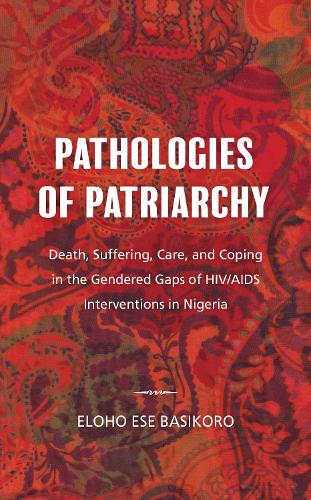
Pathologies of Patriarchy: Death, Suffering, Care, and Coping in the Gendered Gaps of HIV/AIDS Interventions in Nigeria
(Hardback)
Publishing Details
Pathologies of Patriarchy: Death, Suffering, Care, and Coping in the Gendered Gaps of HIV/AIDS Interventions in Nigeria
By (Author) Eloho Ese Basikoro
Bloomsbury Publishing PLC
Rowman & Littlefield International
28th October 2019
United Kingdom
Classifications
Professional and Scholarly
Non Fiction
Non-governmental organizations (NGOs)
Gender studies, gender groups
Politics and government
362.1969792008209669
Physical Properties
Hardback
218
Width 159mm, Height 235mm, Spine 18mm
481g
Description
In the delta region of Nigeria, women seeking HIV care face a plethora of deeply gendered inequalities. As a result, HIV-positive women are often unable to use the treatment schemes that are seemingly available to them. Pathologies of Patriarchy brings together a geographic analysis of gendered inequalities with practical implementation questions concerning the limits of current global health programming. This book is an experiential analysis of HIV treatment programs that includes first-hand accounts of how female patients explain and cope with the poor access to and the inconsistencies in the delivery of HIV service care that complicates their adherence to treatment, and the complex power relations they navigate daily. Eloho Ese Basikoro also addresses the failures of policy-makers who talk about gender mainstreaming but fail to deliver sustainable health services for disenfranchised women suffering from the social stigma and alienation associated with seropositivity. This inter-regional study is of disciplinary and interdisciplinary interest to a wide variety of scholars and policy-makers, whether they are researching gendered inequality from a geographical, anthropological or global health perspective, or interested in broader concerns about development and inequality in sub-Saharan Africa.
Reviews
Drawing on her 2016 dissertation (medical geography, Univ. of Washington), Basikoro has written an exhaustive. . . analysis of how living in patriarchal societies located in sub-Saharan Africa affects HIV-positive women. Basikoro conducted intensely personal interviews with HIV-positive women about their experiences accessing medical treatment in countries where women are undervalued not only by their husbands, but also by a male-dominated social system in which gender discrimination is institutionalized. Few women have jobs that would allow them to support themselves and their children, and they choose to stay in unhappy and sometimes violent marriages in order to make sure that they and their children are financially supported. Many respondents admitted to feeling emotionally and physically drained by the responsibilities of taking care of the home, the children, and the husband, all of which leads them to forgo medical care or to seek it only sporadically. For readers interested in the specifics of how male-dominated social structures can affect access to medical care especially for HIV-positive women, this volume provides insight. . . Summing Up: Recommended. Graduate students, faculty, and professionals.
Author Bio
Eloho Ese Basikoro is Adjunct Lecturer, University of Washington, Seattle
